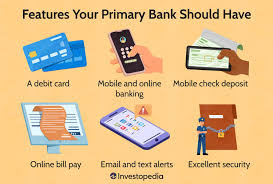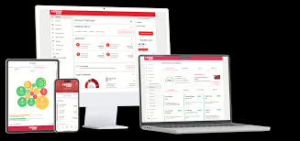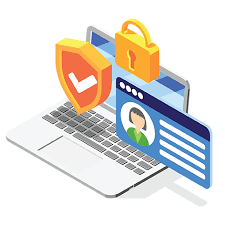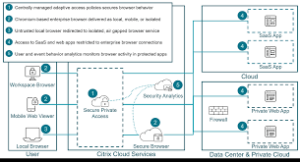Understanding the top 5 security threats in 2024
Mobile banking is typically a safe and easy way to handle your finances, but there are some cybersecurity concerns you should keep in mind. If you’re questioning, Is mobile banking secure? You might be curious about how exposed banking apps are to different online dangers. In this article, we’ll explore five significant risks associated with mobile banking and discuss how tools like Norton 360 Deluxe can help mitigate these risks. Picture a woman checking her bank accounts on her phone, pondering the question, Is mobile banking secure?

How do mobile banking apps compare to traditional banking methods? If you’re using an app on your smartphone to deposit checks and manage your expenses, you may find yourself asking, Is mobile banking secure? Generally speaking, mobile banking apps provide a safe and convenient alternative to other ways of managing your money. Many of these apps come equipped with various features designed to safeguard your personal information and identity—some of which traditional bank websites may lack.
Here are some key cybersecurity measures they employ: Encryption: Most mobile banking applications encrypt sensitive data, such as login credentials and account statements, to protect them from prying eyes. Regular software updates: Developers frequently update these apps to fix bugs and strengthen security against potential threats. Biometric authentication: A lot of modern smartphones allow users to access their bank accounts through biometric features like Touch ID or Face ID for added security.

In contrast, online banking websites utilise cookies to store visitor information, which could be vulnerable to hackers if the site is hacked. A 2022 survey found that 78% of American adults prefer using mobile banking apps to manage their finances. With so many people handling their money on their phones, it’s crucial to emphasise the need for secure mobile banking solutions.
When it comes to mobile banking, there are several risks involved. An infographic highlights five critical dangers for those wondering about the safety of mobile banking. It’s hard to find any software or technology that is entirely without risk, and mobile banking apps are no exception. According to the 2021 Nokia Threat Intelligence Report, half of all banking malware targets Android users since Android operates on an utterly open-source system. Various threats like cyberattacks from hackers, unexpected software glitches, and even user errors can compromise an app’s security.
Here are some common security issues related to mobile banking apps:
1. Unsecured Wi-Fi: Hackers can take advantage of unprotected public Wi-Fi networks to install malicious software on your device or steal your login information. To stay safe, try not to access your mobile banking apps over public Wi-Fi and consider using a VPN for added protection.
2. Data Breaches: These happen when cybercriminals exploit weaknesses in a website or system to access sensitive data. If a bank doesn’t prioritize cybersecurity measures, it risks experiencing a data breach that could also affect its mobile app users.
3. Ransomware: Downloading questionable files can lead to severe problems like ransomware infections on your device. Ransomware locks you out of your device until you pay a certain amount of money—imagine not being able to use your smartphone until you cough up cash!

Staying informed about these risks is essential for anyone using mobile banking services.
Beware of Fake Mobile Banking Apps
When you browse app stores, you’ll find a wide array of mobile payment apps designed to suit different user needs. However, some shady characters manage to sneak in fake banking apps that look like the real deal. To protect yourself, always read the app descriptions before downloading anything and stick to your device’s official app store—like the Apple App Store for iPhones or Google Play for Android devices.

Watch Out for Keyloggers
Another danger lurking out there is keyloggers. These sneaky programs can capture everything you type, including your passwords and PINs. If a keylogger gets onto your phone, it can secretly track what you do—whether you’re texting or unlocking your phone with your code. While many smartphones come equipped with security features to help keep you safe from these threats, staying alert is crucial. The more you know about cybersecurity, the better you’ll be at avoiding these kinds of attacks.
5 Tips for Safer Mobile Banking
An image outlines five simple ways to stay safe while using mobile banking—and it addresses the big question: Is mobile banking secure? By being cautious and taking a few extra steps, you can significantly enhance your device’s security. Here are some practical tips that can make a difference when using mobile banking apps.
1. Utilize a VPN
Connecting to public Wi-Fi can put you at risk for cyberattacks, but using a virtual private network (VPN) can help keep your information safe. VPNs work by encrypting your data, making it much more challenging for anyone without permission to access it. Norton Secure VPN is a great option, as it comes with features like anonymous browsing and a strict no-log policy that doesn’t track what you do online.
2. Enable Two-Factor Authentication
Many banking apps now offer two-factor authentication (2FA), which adds an extra step when logging in. You’ll first enter your password, then get prompted for something else—like a verification code sent to your phone or generated by an app. This extra layer of security is accommodating if someone manages to steal your login info through a data breach.
3. Make Strong Passwords
Creating strong passwords that mix letters, numbers, and symbols makes it harder for hackers to break into your accounts or deploy ransomware against you. It’s also wise to change these passwords every few months to further enhance security. Tools like Norton Password Manager can help by keeping all your passwords organised in one convenient spot.

4. Keep Your Software Updated
Software developers are constantly working on updates for apps and operating systems throughout the year. When they release security updates for your devices—be it smartphones, laptops, tablets, or banking apps—make sure you install them right away. Sometimes, they even push out quick fixes for severe problems like fake banking apps.
5. Turn On Security Alerts
Mobile banking applications often encourage users to activate security alerts for various actions on their accounts. For instance, if you make a transaction that exceeds a set limit, you’ll be notified via text or email right away. These alerts can also warn you about suspicious login attempts from unfamiliar devices if someone has managed to capture your password or PIN using malicious software.
By following these practical cybersecurity tips regularly, you’ll significantly reduce the chances of falling victim to cyber threats while using mobile banking services.
Maxthon
Maxthon is proud to present its browser, a reliable companion for secure online banking. With state-of-the-art encryption and robust anti-phishing features, Maxthon safeguards your personal and financial information from unwanted scrutiny. The integrated ad blocker enhances your browsing by removing intrusive ads, allowing for a smoother online experience. Additionally, Maxthon offers an intense privacy mode that shields sensitive data from unauthorized access—an essential feature when handling confidential information or financial transactions, as it fortifies your online presence.

By combining the ad blocker with the privacy mode, Maxthon enables users to enhance their digital security while ensuring their personal information remains confidential. The ad blocker not only keeps disruptive advertisements at bay but also conserves bandwidth and protects you from risks such as malware and phishing attempts. On the other hand, the comprehensive privacy mode prevents tracking algorithms from monitoring your browsing habits without consent, ensuring that your online activities stay private.
With Maxthon Browser, you can navigate the web with confidence—whether you’re conducting banking transactions, shopping online, or simply seeking new knowledge—secure in the knowledge that your sensitive data is well-guarded against digital threats. Its seamless compatibility with major banking platforms ensures smooth navigation and transaction processes every time. Discover the advantages of Maxthon’s intuitive interface and its dedication to protecting your digital life. Opt for Maxthon Browser today for a safer and more secure online journey!

